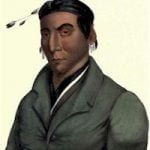
A Chippeway Chief
There is, in general, so great a sameness in the Indian character, that the individuals may be said to differ rather in the degree of physical and mental strength with which they are endowed, than in the qualities of their minds. The pursuits of all being the same, there must naturally be a similitude of intellectual development, and we find accordingly but little variety of character, except that arising from extraordinary instances of bodily vigor, or still more rarely, from superior native talent. Their hunters and warriors are great, greater, and greatest, but still they are but warriors and hunters, practicing, with more or less success, the same arts of sylvan warfare against the brute inhabitants of the lake and forest, or snatching by similar devices the bloody trophies of victory, in perpetual feuds with each other.
It is therefore an agreeable relief to turn from the monotonous recital of the wiles of battles and ambuscade, to the contemplation of a pacific character. The chief, whose portrait is before us, deserves honorable mention as one of the very few of his race who condemned, by precept and example, the vindictive and bloody wars, so common, and so fatally destructive, among the ill-starred aborigines. Although we do not learn that his courage was ever questioned, he never took an active part in war, but discouraged it on all occasions, as far as his situation and influence allowed. At the councils, in which, as an able speaker, he was a prominent person, he usually harangued in favor of pacific measures, recommended negotiation and remonstrance, rather than revenge and violence, and sought to allay the excitement which ordinarily prevails at the meetings of the antagonist and turbulent denizens of the wild.
Katawabeda was an orator of no small repute. Expert and ready in debate, his speeches were marked by shrewdness, ingenuity, and subtlety of argument, and by a simple brevity and force of expression. Some of these displays of native eloquence were well worthy of preservation, but we are not aware that any of them have been recorded except in the memory of those who sat in the councils of that lonely region of lakes and forests, of which this remarkable. Indian was a native and a ruler.
He was the principal village chief the civil head, as distinguished from the war chief, or military leader of a band of the Chippeway nation, who reside at Sandy Lake, or Kometongogomog, among the head springs of the Mississippi, and was a sensible, prudent, politic man, who was revered by his own people, and looked up to as a safe counselor by the surrounding villages.
